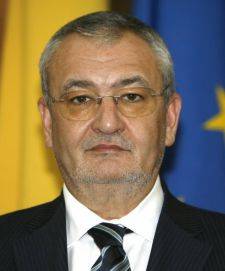On 11 September 2018 – DNA Prosecutor Victor Ponta and OLAF – Italian Anti Mafia
On July 2002 – PNA – DNA Prosecutor Victor Ponta was a captain in the secret services SIE (the New Securitate), working with OLAF. He would later (2010) promote DNA prosecutor Claudiu Dumitrescu (our specific case OF/2005/0417) to DLAF and promote him again (2013) to DNA (our specific case OF/2010/0068).
Claudiu Dumitrescu is reputed to be a close friend of SRI – Florian Coldea.[1]
În data de 7 Julie 2013 – Ovidiu Ohanesian [2] publică:
A doua scrisoare deschisă către Victor Ponta
“Dacă aţi locuit ulterior la un anume Marin Bobeică, ofiţer acoperit al SIE la Paris, cunoscut ca homosexual, şi dacă aţi întreţinut relaţii nefireşti cu acesta?”
Victor Ponta a întreținut relații nefirești cu OLAF – DNA – SIE – SRI – MAI… Sebastian Ghiță, Claudiu Dumitrescu (care s-a cerut la OLAF) , Microsoft, Sorin Ovidiu Vîntu (Irinel Paun) și (prea) mulți alții.
În data de 11 Septembrie 2018 – Mirel Ciurea publică:
“În octombrie 2014, Traian Băsescu, la acel moment președinte al României, a declarat public: „Victor Ponta trebuie să recunoască că în perioada 1997-2001 a fost ofiţer acoperit al SIE”, a anunţat preşedintele, precizând că acest lucru arată şi „saltul lui”.
„A fost, în perioada 1997-2001, ceea ce explică şi propulsarea lui de la Parchetul de la Judecătoria de sector direct în Parchetul General. Nu este nicio bombă, este o realitate pe care eu sunt gata să o demonstrez„.
Pe parcursul anului 2000, în perioada premergătoare plecării la un stagiu de trei luni, dec 2000 – feb 2001, în Italia, la Procuratura Naţională Anti-Mafia, Victor Ponta a fost selecționat, recrutat, pregătit și trimis în misiune ca ofițer SIE sub acoperire, cu gradul de căpitan.
În Italia a executat misiuni foarte precise, în principal de cunoaștere a unor metode de lucru ale serviciilor de informații interne din Peninsulă, pe linii de muncă speciale, de care s-a achitat onorabil. Atât de onorabil, încât la întoarcerea în țară, a împartășit din cele aflate ofițerilor SIE cu atribuțiuni pe linia respectivă, sub forma unor cursuri. Idem în SUA, în martie 2001, la Departamentul Trezoreriei al SUA (US Secret Service), idem, în iulie 2002, la OLAF.[3]
On 7 September 2018 – President Klaus Iohannis approved a new criminal investigation of ex Minister of IT&C Gabriel Sandu (our specific case 216/P/2006- 85/P/2011 – OF/2010/0068) regarding Microsoft[4]: “Președintele României, domnul Klaus Iohannis, a transmis vineri, 7 septembrie a.c., ministrului justiției cererea de urmărire penală a domnului Sandu Gabriel, în calitate de fost ministru al comunicațiilor și societății informaționale în perioada decembrie 2008 – septembrie 2010, pentru faptele ce fac obiectul Dosarului penal nr. 476/P/2014 (Mihaiela Moraru Iorga) al Parchetului de pe lângă Înalta Curte de Casație și Justiție – Direcția Națională Anticorupție – Secția de combatere a infracțiunilor asimilate infracțiunilor de corupție, pentru săvârșirea infracțiunii de trafic de influență prevăzută de art….”
Please consider to inform Commissioner Margrethe Vestager that she ought read the books Microsoft the Guardian Angel (DG COMP has got many volumes received from other institutions in 2010) and Ovidiu Artopolescu declaration and to reconsider protecting Microsoft at the cost of the Union’s credibility and tax payer’s money.
How the weak vanquished the strong TOM GALLAGHER – 2009
Verheugen’s one visit outside the capital was to the city of Cluj, where the ultra-nationalist mayor Gheorghe Funar had just gone down to electoral defeat. While there, he reproached Romanians for ‘suffering [an] inferiority complex . . .
Your country has evolved and is capable of closing negotiations and making all preparations within the timeframe agreed’.
The inferiority complex presumably gripped the society and not a self-confident elite that felt it was entitled to the prize even with minimum effort. The commissioner’s office had chosen the relatively placid city of Cluj for his showcase visit.
Perhaps reality might have broken through if he had gone instead to Bacau, headquarters of the North-East Regional Development Authority. It was the centre of the oil industry and the political stronghold of the powerful PSD politician, Viorel Hrebenciuc, who also headed Parliament’s commission on European integration.
OLAF had discovered possible irregularities in the use of EU funds involving companies that he was linked to.
The newspaper Evenimentul Zilei published its report. But the go-ahead for any prosecutions was required from a senior official in the government who, like Hrebenciuc, was one of the PSD’s Vice-Presidents: Victor Ponta.
He was head of the Prime Minister’s Control office that monitored government expenditure, and he failed to see any grounds for prosecution. The lack of coordination in the EU system over this serious issue was painfully evident from an interview given by Scheele in June 2004.
The Delegation chief conceded that neither he nor the rest of the Delegation in Bucharest had been following the OLAF investigation into the fate of Phare funds in Bacau. But he revealed that it was OLAF’s choice to make Ponta their chief liaison in Romania. They could have sought a less political figure to interact with, one who placed fewer obstacles Romania and the European Union in the way of acceding to the request for firm action to be taken against those looting EU funds.
Bacau had been one of the centres of loss-making industries controlled by figures close to the PSD. They had been beneficiaries of state aid on political criteria in the form of budgetary credits, non-payment of taxes or guarantees for loans. This was a source of inflationary pressure and low competition in a country with one of the highest inflation and tax rates in the region.
Improvements were supposedly in train: new bankruptcy laws to comply with EU standards. A competition council would obtain independence from the government to monitor and act on both anti-trust practices and state aid. But the effectiveness of these measures to curb rent-seeking would depend on vigilance and firm implementation. By quickly lowering its guard after the EP’s warning in March, the EU was displaying weakness. The debacle concerning the fate of the OLAF report after clear evidence had been found of serious wrongdoing suggested that no serious re-evaluation of Romania was taking place in Brussels. Indeed, there would be little or no mention of one in official documents.
[1] https://evz.ro/imagini-de-colectie-capii-statului-paralel.html
http://m.luju.ro/actele-binomului-colonelul-sri-daniel-dragomir-prezinta-o-noua-mostra-din-colaborarea-dna-sri-procurorii-dna-claudiu-dumitrescu-si-ana-dana-i-au-cerut-generalului-sri-florian-coldea-date-despre-mai-intrarea-in-tara-a-unor-cetateni-greci-unde-apare-in-fisa
http://www.coruptia.ro/2017/10/o-banda-de-teroristi-asasini-claudiu-dumitrescu-florian-coldea-laura-codruta-kovesi-microsoft-fujitsu-siemens-eads-ericsson-comisia-ue/
Alina Grigore and Cristian Oprea, ‘Paul Wolfowitz: Mai sunt multe progresse de facut’, Evenimentul Zilei (Bucharest), 20 May 2003.
[2] https://ohanesian.wordpress.com/2013/07/02/adevarul-despre-premierul-victor-ponta-care-ne-zbarleste-parul/
[3] https://evz.ro/ponta-ofiter-sie.html
[4] https://www.digi24.ro/stiri/actualitate/justitie/klaus-iohannis-a-aprobat-cererea-de-urmarire-penala-a-fostului-ministru-al-comunicatiilor-992742



